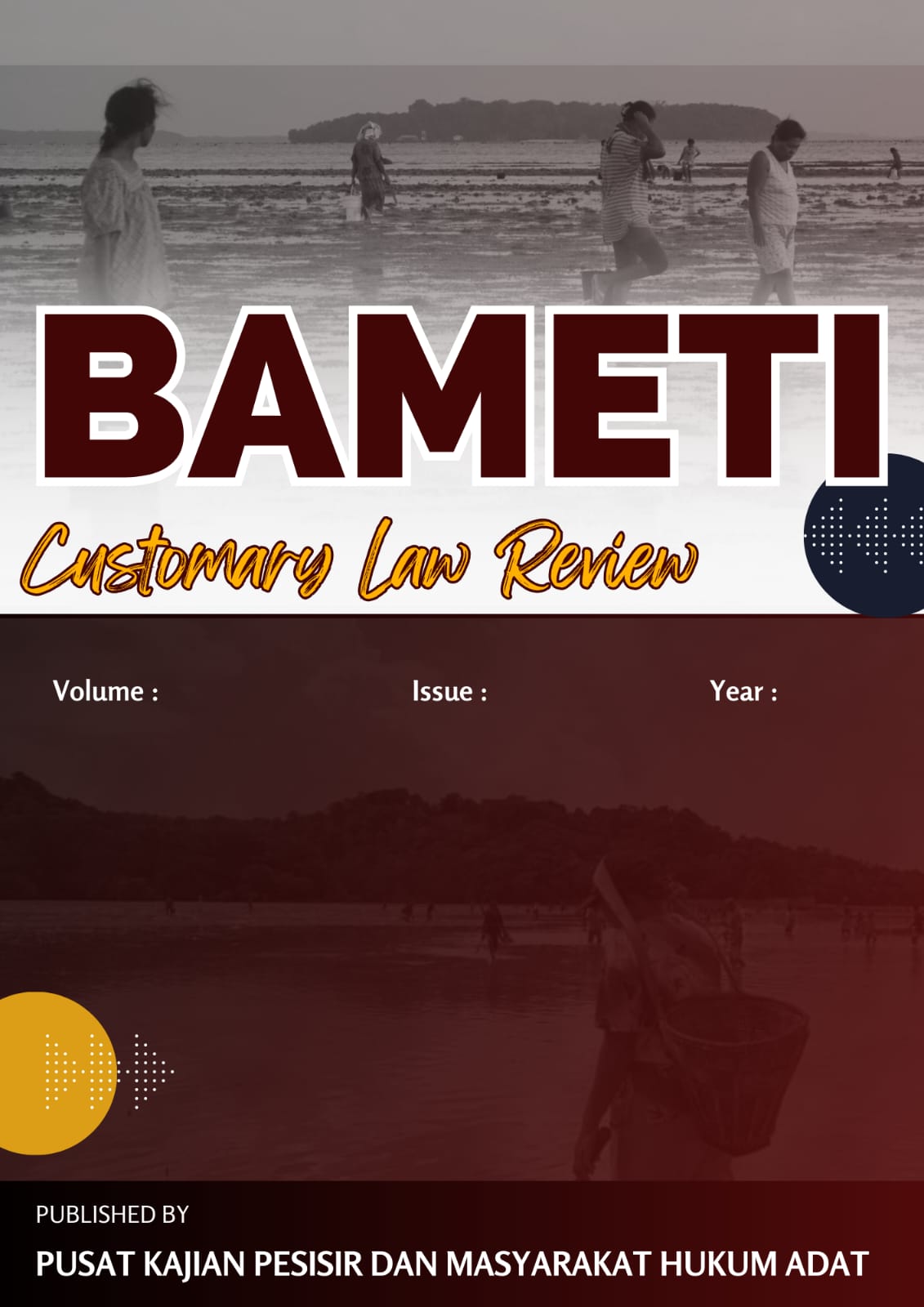Hukum Molo Batu: Bentuk Penyelesaian Sengketa Dalam Kelompok Masyarakat Ada
Abstract
A customary law community is an arrangement of customary law associations whose members are bound by territorial and genealogical factors. Legal experts in the Dutch East Indies era gave the understanding that a territorial customary law community was a permanent and orderly community, which was bound to a certain area, both in worldly terms as a place of life and in spiritual terms as a place of worship for ancestral spirits. . Recognition and respect for the existence of customary justice can be seen through article 18 B paragraph 2 of the 1945 Constitution. Article 18 B paragraph 2 of the 1945 Constitution. The State recognizes and respects customary law community units and their traditional rights as long as they are still alive and in accordance with the development of society and principles of the Unitary State of the Republic of Indonesia, which are regulated in law. The law of Molo (Diving) Batu is a custom of indigenous peoples that occurs in Hulaliu Country, Huaruku Island District. Molo Batu is a traditional procession to resolve land boundary disputes. Usually the Molo Batu procession is the end of the stages taken by the traditional institutions of Hulaliu Country, where the procession resolves land disputes. is the same as traditional institutions in general, where it starts with mediation, gathering evidence, reviewing the location or what is usually called pulling the chain (chain) at the boundary, decision making by Upu Pati Launusa (King) and Saniri, if one party feels they are not benefiting then will continue with the Molo Batu customary law.
Downloads
References
Arman Anwar, Model Peradilan Adat Pada Negeri-Negeri Islam Di Pulau Ambon Dan Pulau-Pulau Lease, https://fh.unpatti.ac.id/model-peradilan-adat-pada-negeri-negeri-islam-di-pulau-ambon-dan-pulau-pulau-lease/
Djamanat Samosir, Hukum Adat Indonesia. Medan: Nuansa Aulia, 2013.
Herlin Manik, “Eksistensi Lembaga Adat Melayu Jambi Dalam Penyelesaian Sengketa Masyarakat Adat” Jurnal Selat Volume. 6 Nomor. 2, Mei 2019.
Hilman Hadikusuma, Pengantar Ilmu Hukum Adat Indonesia, Bandar Lampung: Mandar Maju, 1992,
---------------------------, Hukum Waris Adat, Bandung: Citra Aditya Bakti, 2003.
http://digilib.unila.ac.id/2194/6/BAB%20II.pdf
https://id.wikipedia.org/wiki/Hulaliu,_Pulau_Haruku,_Maluku_Tengah
https://repository.uksw.edu/bitstream/123456789/29280/12/T1_312018034_Bab%20II.pdf
Husen Alting, Dinamika Hukum dalam Pengakuan dan Perlindungan Hak Masyarakat Hukum Adat Atas Tanah, Yogyakarta: LaksBang PRESSindo, 2010,
Ismail Rumadan “Peran Lembaga Peradilan Sebagai Institusi Penegak Hukum Dalam Menegakan Keadilan Bagi Terwujudnya Perdamaian”, Jurnal Rechts Vinding, Vol: 6 No. 1, April 2017
Koentjaraningrat, dkk. Masyarakat Terasing di Indonesia. Jakarta: Gramedia dan Depsos, 1998,
Marius Agustinus Welliken K, Tradisi Molo Sabuang Masyarakat Marafenfen Di Kabupaten Kepulauan Aru, Maluku, Sabda Volume 12, Nomor 1, Juni 2017 ISSN 1410–7910 E-ISSN
Putra Aguswandi “Penyelesaian Tindak Pidana Melalui Peradilan Adat Di Aceh”, Jurnal Syari’ah dan Peradilan Islam, Vol: 1 No. 2, 2021,
Rikardo Simarmata, Pengakuan Hukum Terhadap Masyarakat Adat di Indonesia, Jakarta, UNDP Regional Centre in Bangkok, 2006,
Soejono Soekanto, Sosiologi Suatu Pengantar. Jakarta: Raja Grafindo Persada, 2012,
Soekanto, Kedudukan dan Peranan Hukum adat Dalam Pembangunan, Majalah Hukum dan Pembangunan No. 5, Tahun, 2002, FH. UI, Jakarta
Soerjono Soekanto. Hukum Adat Indonesia. Jakarta: Rajawali Pers, 2010.
Copyright (c) 2024 Ekberth Vallen Noya (Author)

This work is licensed under a Creative Commons Attribution-NonCommercial 4.0 International License.
Authors who publish their manuscripts in this Journal agree to the following conditions:
- The copyright in each article belongs to the author, as well as the right to patent.
- Authors are able to enter into separate, additional contractual arrangements for the non-exclusive distribution of the journal's published version of the work (e.g., post it to an institutional repository or publish it in a book), with an acknowledgment of its initial publication in this journal.
- Authors are permitted and encouraged to post their work online (e.g., in institutional repositories or on their website) prior to and during the submission process, as it can lead to productive exchanges, as well as earlier and greater citation of published work.
- Authors have the right to self-archiving of the article (Author Self-Archiving Policy)













